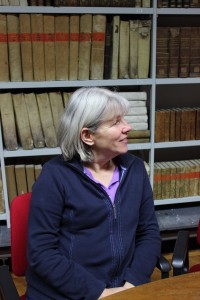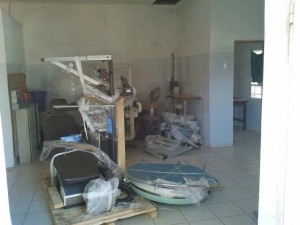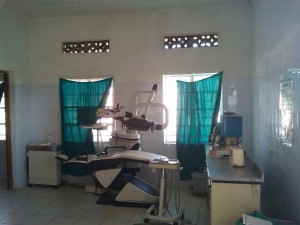HOLY SPIRIT HOSPITAL. MAKENI. BOMBALI. NORTHERN PROVINCE. SIERRA LEONE
5/11/2014
Hi,
I can’t believe I am into my second week already, on one hand, and on the other – I feel as if I have been here much longer, and feeling very much part of Holy Spirit Hospital (HSH). I arrived on Sunday 26th October and was met by Fr Dominic Johnson, who happens to be the PP in the parish close to the hospital. He has (what many of us would feel as) the unfortunate job of meeting and dropping people to the airport. Air Maroc, one of the few airlines flying into Sierra Leone, flights arrive at 3.30am.
By the time I got through hand washing, health check form filling, health check interview, immigration and baggage collection it was easily 4.30am. Fr Dominic was outside waiting, happy, cheerful and welcoming. I got a couple of hours rest before joining in the parish Mass at 9.30am, when I knew I had really arrived to Africa.
A hand washing station – a bucket with a connecting tap containing chlorinated water was at the doors and everyone used it. The people, as has always been my experience, were very welcoming, and it was a struggle not to shake hands – particularly with the children, who flock around you.
The church was a very simple one, open and spacious, but I made sure to sit near the door, because of the heat, but also because I knew I was to be collected about 11am. Mass began at 9.30,and it was a special mass for the youth. There was lots of singing, and everyone joined in… the roof was really lifted. I felt really privileged to be there. Fr Dominick prompted me to leave when I went up for the second collection at the end of Mass…. it was 11.30 and the final blessing, announcements and the closing hymn were still to come. He was right, the car had arrived from Makeni to pick me up. The driver, Amadu, I have since come to know very well. It was obvious I wasn’t the first person he had collected. He too gave me a great welcome, thanking me for coming to their country to help. Amadu prepared me for the check points and temperature checks, we would encounter enroute. Travel to Makeni is restricted, as it is to all Ebola effected areas. You have to have a special pass to get through. Because we were associated with Holy Spirit Hospital, we had the necessary pass.
There were police checks at each town and temperature checks at four of these. We passed the checks – but it is amazing how you can feel anxious coming to the check points just the same. I knew I didn’t have a temperature, and yet because it was hot, for me, I found myself wondering what will I do if they tell me I have a temperature. Thankfully all was well and we arrived to Makeni after two and a half hours.
Makeni is the Provincial Headquarters of the Northern Province of Sierra Leone, which has five districts: Bombali, Tonkolili, Koinadugu, Port Loko and Kambia. Makeni is situated in Bombali Sebora chiefdom. The main tribes in the area are TEMNE, LIMBA, FULLAH and MENDE.
I met Fr Aris at the Xavierian house, where he was staying, at the invitation of Fr Natalio, the Apostolic Administrator. Again, another very warm welcome. Later we met together, and I was brought up to date with the general situation, the problems and what we could do to help. My first focus is helping the hospital to reopen to inpatients. It had closed to inpatients in August because of the high risks for health care staff. Many health care workers had died, though none were from HSH.
I have since learned that no staff member was lost at HSH because of the measures they had taken to protect them. One of the measures, closing the hospital, was a difficult one to make. Another was to terminate the contracts of any staff member who was working in another health institution also. This was to try and limit / reduce the risk of cross contamination. This decision wasn’t easy either, as people’s livelihood was effected, but it was deemed necessary to preserve life. The hospital Out Patients (OPD) has continued to function, but attendance has dropped considerably, due to FEAR of contracting Ebola. Fear, though not openly expressed, is undercurrent all the time. I don’t think this is difficult to understand. When I think about the level of fear that was present at home before I left. Our fears were all about how prepared were we, if anyone should enter the country from an Ebola effected country. What measures were in place? What protocols were there? How would a person presenting with suspected Ebola be treated? Where would they be treated?
The people here have Ebola in their midst. They are afraid to come to the hospital, because they fear that they will automatically be suspected of having Ebola. They are afraid that they will be transferred to a Holding Unit (HU). They are afraid because they may contract Ebola. The staff are afraid of contracting Ebola, even though they have taken many good steps to reduce their risk. A security firm has been hired to control entry and exits from the hospital. Everyone entering has their temperature checked. Patients are triaged at the gate, and anyone with a temperature is separated from the rest of the patients, for more details on their complaint, before they can register and see the doctor. The gate register and the OPD register are cross checked to ensure strict adherence. It also allows for contact tracing if needed.
Staff temperatures are monitored and recorded every morning. Any staff that comes in contact with family or neighbours with unexplained fever, suspected Ebola, deaths are paid to stay at home for the Quarantine period (21 days). The staff are keen to see the hospital reopen, but want to be protected from Ebola. There is a lot of practical work going on to prepare for the reopening, general cleaning and fumigation, building up stocks, eg Personal Protective Equipment (PPE). In reality this will not happen as long as there is not a laboratory testing facility for Ebola here.
In carrying on with their day to day tasks in the OPD, staff are psyching themselves up for the reopening. But nearly every other day, a situation arises that renews their anxiety about reopening. There were two examples of this already this week, and it is only Wednesday. The first was on Monday morning when news arrived that one of the doctors in another hospital was fighting for his life, and by the afternoon, his death was reported. This is very difficult for the Doctors here who knew him but also for the staff. It also highlights the implications for staff here, if any staff member contracts Ebola. Health staff in the hospital where the Doctor died, were subsequently quarantined.
On the same day, late morning, a mother of a young child, was referred from the Government hospital, for an utrasound. AT the time she arrived, there was a power cut, so it was not possible to do the ultrasound. Staff advised her to go home and return on Tuesday morning for the test. The family came on Tueday morning to reclaim the fee, as she had died at home during the night. The cause of her tragic death is as yet unknown, but she will be tested for Ebola as a matter of routine. Because there is not an Ebola Laboratory here in Makeni, it will be a few days before the result is known. Immediately the news was heard here in HSH, all areas she had passed through were fumigated (and also the ultrasound room, though she hadn’t gone in). This gives a small picture of just how complex the situation is here.
In the meantime, my job is to support the hospital and staff in whatever way I can, during my time here. In all that I have done during my short time here, I believe being here and being present to the staff is the most important. Of course I have lots of practical tasks to accomplish, that will I hope, support the reopening of the hospital soon. Reopening of the hospital is vital to the population of Makeni town and the wider district. This was a flourishing, self sustaining, cost recovery hospital prior to Ebola. Now it is in debt, struggling to remain open, and many of their services are paralysed.
I have spent time gathering information about how the hospital functioned pre Ebola and how it is functioning now. Myself and Matron, Ann Marie Koroma, have assessed all the inpatient unit regarding repairs needed, and discussed strategies required to promote high standard of infection control. Staff have already received update training on Ebola, detection, prevention, treatment, use of PPE’s and hand hygiene. Some of the changes identified, to improve infection control and reduce risk of cross infection, will be culturally difficult to implement (restriction of visitors), but the resolve is there.
Other strategies will have cost implications, for example the reduction of the number of patients in each ward (from 5 to 3), the reduction in the nurse / patient ratio – one nurse to be assigned to each ward, and to be responsible for all care just for that ward – again, to limit / reduce the risk for cross contamination. And again the resolve is there. But all staff express that the hospital should have an Ebola laboratory in order to reopen. If there is laboratory facilities in the area, test results can be obtained within a few hours, allowing for fairly immediate diagnosis, thereby reducing the risks for infection to others. It will reduce unnecessary referrals for suspect cases of Ebola to holding units pending the result of the test, which currently takes a few days to come back, where risks of becoming infected are high. It will allow for the immediate referral to Treatment Unit for confirmed cases, and improve their chance for survival.
Space can be adapted and made available here at HSH for this laboratory. The hospital would be in a better position to reopen. CTF (Camillian Task Force), in Rome are working hard, advocating for and collaborating with other sources, to progress establishing an Ebola laboratory. We are very hopeful that it will be a reality before too long more. Alongside this, materials and supplies to assist the hospital reopen have been arriving, so there is a lot of work to do in this area. It is great to see supplies arriving, but equally there is a lot of work involved to ensure that everything is received and everything is packed and stored appropriately. The combination of the hot climate and PPE’s makes it particularly hard for those who help with unloading. The opportunity to earn some extra money lifts their spirits, and all is accomplished good humouredly.
Meanwhile Ebola continues. There were 58 confirmed cases in Bombali district, where Makeni is located, and 133 in total for the 5 Districts in the Northern Province for the first 5 days of November!! So there is more to do. On a more positive note, at least the message about Ebola is getting out there. I have heard a couple of really catchy (excuse pun) songs on the local radio. Hands are washed, like they never were before (my own included), with hand washing stations available nearly every where. In the meantime, we, CTF, continue to do whatever we can to help, through our collaboration with the Catholic Diocese of Makeni. The Diocese is intervening in a number of ways. They are providing support and assistance to families in quarantine, with essential food and non food items.
They are developing a psychosocial programme, to assist all who are affected in any way, but particularly for those who have survived. Reintegration into their local communities has not been easy. People are fearful of them, though they have fully recovered and have been issued with a certificate to say they have been discharged and are not a risk to the community. Reintegration is an issue also for returning aide workers. All very understandable, but hopefully as we come to grips with “this Ebola” as it is referred to here, our fears can be allayed. Keeping distance, no touch and lots of hand washing are the rule of thumb here, and are keeping most of us safe and well.
Please keep the opening of an Ebola Laboratory and the reopening of HSH for inpatients, as well as the Psychosocial Programme uppermost in your prayers. The local community and the district need functioning healthcare facilities to prevent death from very treatable illnesses.
Thank you for all your support.
Anita 🙂
To make your contribution click here

















Camillians on Facebook
Camillians on Twitter
Camillians on Instagram